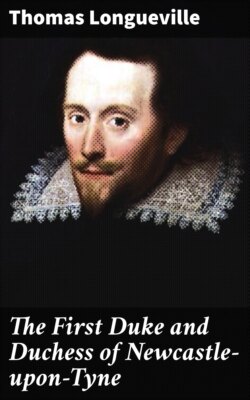Читать книгу The First Duke and Duchess of Newcastle-upon-Tyne - Thomas Longueville - Страница 6
На сайте Литреса книга снята с продажи.
“Mansfield to the Duke of Buckingham.
ОглавлениеTable of Contents
“To my most Honble Patron the Duke of Buckingham his Grace.
“May it please your Grace,
“Accordinge to your Lop commands I have treated with my cosen Pierepoint, and as effectually as I coulde, his answer in his own wordes are these: he sayeth that Doctor Moore treated with him in King James his times aboute Honor, and tolde him that if he woulde be a Baron he might and for 4000£.
Soone after that creation, he shoulde have the Honor to be a Viscount for 4000£ more, and within a little space after that to have the Dignety of an Erle conferr’d upon him for 4000£ more. And further he sayeth that a Scotch Knight offered him the Honor of a Viscount for 5000£ at the first, slippinge the title of a Baron. So that by this Valuation an Erle by purchase is but a reasonable bargaine att 12,000£ and a Viscount at 5000£ and a Barron 4000£.... For my parte, I never herde that a Baron was under 9 or 10,000£, but for my one experience I had little more than in the quittinge of an olde debt.”
Cavendish, even early in his life, lent, or gave, large sums to the King, and by what he says about “quittinge of an olde debt,” he probably means that his peerages were given to him in lieu of payment of the debts owed to him by the King. He continues:—
“He sayeth further that he is not a moneyde man and I believe itt, for he purchases mutch and therefore he sayeth he can not paye any great sum downe uppon the nayle, butt as he gets itt oute of his revenues, and so he must paye itt, and I think he would be loth to gve upon interest for Honor ... I protest, my Lo: I have dun my uttermost, and can get no more oute of him but infinite thankes to your Grace for his favour, and sweares he will never be a Lord but by your Grace’s favour, or your Hoble Mother’s whilst he lives. I thinke that if your Lop did speake with him at London, he might be brought to good termes....
“Your Grace’s
“W.[9] Mansfield.
“Feb. 27
“1626.”
[9] In those times peers sometimes signed their names with an initial before the title.
It may have been observed that Cavendish writes as if payment for peerages were a matter of course, a rule in fact; and, allowing for the difference in the value of money, they appear to have cost as much then as they cost now, or even more. Evidently any man “willing to receave honor,” and willing to pay for it, was looked upon as fair game.
In the seventeenth century there was no central Conservative or central Liberal fund to receive the payments for peerages. Who then received them? Would it be the King? or would it be Buckingham?
“My cosen Pierepoint” must have submitted to be bled and to be bled freely; for a couple of months later he was created Baron Pierrepont, of Holme Pierrepont, Co. Nottingham, and Viscount Newark; and a year later he was created Earl of Kingston-upon-Hull.[10] Probably Buckingham took Cavendish’s advice as to Pierrepont, “spoke with him at London” and “brought him to good termes”—most likely something much better than the £12,000 mentioned in Cavendish’s letter. Let no one henceforward speak about the purchase of peerages as if it were a modern abuse.
[10] Burke’s Extinct Peerages, p. 427.
In the year 1628, Cavendish was created Earl of Newcastle-upon-Tyne and Baron Cavendish of Bolsover;[11] and no doubt he was made to pay a good round sum in hard cash for this reward of “his true and faithful service to his King and Country”.
[11] He inherited the Barony of Ogle on the death of his mother who had eventually become sole heiress to the dignity of her father. He then waived any right he might have to that dignity by his first creation (Biog. Brit.).
In spite of what we have read as to Cavendish being out of favour with Buckingham, the letter just quoted shows that Buckingham entrusted him with so delicate and confidential an errand as the squeezing of money out of a candidate for a peerage. The following letter, written a year later than the first, and shortly before Cavendish’s promotion to an earldom, proves that Buckingham employed him also in an, if possible, even more purely business transaction, although with the same negotiator, namely, “my cosen Pierepoint,” who had now become Lord Newark.
“State Papers, Domestic, Charles Ist. Vol. CVIII, No. 72. June 1628.
